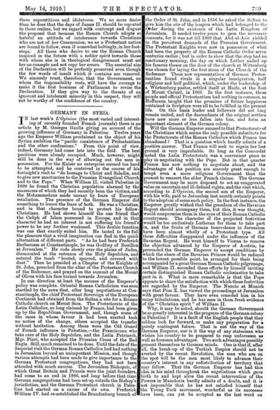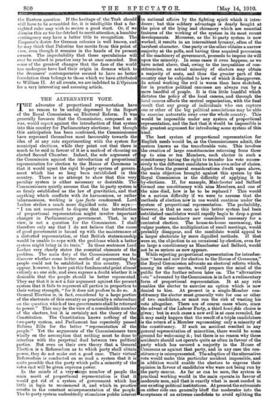GERMANY IN SYRIA.
TN last week's L'Opinion (the most varied and interest- ing of recently founded French journals) there is an article by M. Georges Gaulis giving an account of the growing influence of Germany in Palestine. Twelve years ago the Emperor William proclaimed as the object of his Syrian ambition the "pacific coexistence of Protestantism and the other confessions." From this point of view, indeed, Germany had come late into the field. The best positions were already occupied. Much, however, might still be done in the way of elbowing out the men in possession. For the Kaiser no enterprise seemed too hard to be attempted, and he contrived in the course of his fortnight's visit to "do homage to Christ and Saladin, and to give new sanctuaries to the Prussian Evangelical Church and to the Pope." When William II. visited Palestine in 1898 he found the Christian population alarmed by the massacres of which they had recently been the victims, and the Mohammedans made uneasy by fears of European retaliation. The presence of the German Emperor did something to lessen the fears of both. He was a Christian, and in that character bound to protect his fellow- Christians. He had shown himself the one friend that. the Caliph of Islam possessed in Europe, and in that character he had an interest in not suffering his friend's power to be any further weakened. This double function was one that exactly suited him. He tasted to the full the pleasure that a vivid imagination can find in the quick alternation of different parts. "As he had been Frederick Barbarossa at Constantinople, he was Godfrey of Bouillon at Jerusalem." He rode slowly over the plains of Judea, dismounted at the entrance of the Holy Sepulchre, and entered the tomb "booted, spurred, and covered with dust." Then he presided at a Chapter of the Knights of St. John, preached from the altar of the Protestant Church of the Redeemer, and prayed on the summit of the Mount of Olives with his face turned towards Jerusalem.
In one direction at least the success of the Emperor's policy was complete. Oriental Roman Catholicism was soon startled by the news that, after long negotiations at Con- stantinople, the chief Protestant Sovereign of the European Continent had obtained from the Sultan a site for a Roman Catholic church on Mount Sion. The Protectorate of the Latin Catholics, so long claimed by France, had been given up by the Republican Government, and, though some of the races in whose favour it had been exerted took no notice of the change, others accepted the transfer without hesitation. Among these were the Old Guard of French influence in Palestine,—the Franciscans who take care of the Holy Sepulchre, and the Latin Patriarch, Mgr. Piavi, who accepted the Prussian Cross of the Red Eagle. Still,much remained to be done. Until the date of the Imperial visit the German Roman Catholics had had nothing in Jerusalem beyond an unimportant Mission, and though various attempts had been made to give importance to the German Protestant congregations, they had not been attended with much success. The Jerusalem Bishopric, of which Great Britain and Prussia were the joint founders, had come to an end in 1886, and long before that time German congregations had been set up outside the Bishop's jurisdiction, and the German Protestant church in Pales- tine had started on a career of its own. Frederick William IV. had re-established the Brandenburg branch of the Order of St. John, and in 1856 he asked the Sultan to give him the site of the hospice which had belonged to the Order during the existence of the Latin Kingdom of Jerusalem. It needed twelve years to gain the necessary consents, for it was not till 1869 that Abd-ul-Aziz yielded to the persistent demands of the Prussian Government. The Protestant Knights were now in possession of what had been the property of the Roman Catholic Order seven centuries earlier ; but in order to show that the step had no reactionary meaning, the day on which Luther nailed up his famous theses on the door of the church at Wittenberg was chosen for laying the first stone of the Church of the Redeemer These new representatives of German Protes- tantism found rivals in a singular immigration, half religious and half political, which, under the leadership of a Wiirtemberg pastor, settled itself at Haifa, at the foot of Mount Carmel, in 1868. In the first instance, these people and official Protestantism had nothing in common, as Hoffmann taught that the promises of future happiness contained in Scripture were all to be fulfilled in the present life. On this basis leader and followers did not long remain united, and the descendants of the original settlers have now more or less fallen into line, and form an important element of the German colony.
Will the German Emperor succeed to that Protectorate of the Christians which seems the only possible substitute for the Protectorate of the Roman Catholics which France has abandoned ? That is a question which hardly admits of a positive answer. That France will seek to regain her lost ground is very improbable. So long as the Concordat lasted the Latin Protectorate was a convenient piece to play in negotiating with the Pope. But in that quarter France has now nothing to negotiate about, and the advantages of the position are scarcely great enough to tempt even a more religious Government than the present to reassert the older French claims. The German Government may be more disposed to set an exaggerated value on uncertain and ill-defined rights, and the visit which, according to L'Opinion, the second son of the Emperor, with his wife, paid to Jerusalem last month certainly points to the adoption of some such policy. In the first instance, the Emperor greatly wished that the grandson of the Bavarian Regent should accompany them, but this, it was thought, would compromise them in the eyes of their Roman Catholic countrymen. The character of the projected festivities would be too exclusively Lutheran for them to take part in, and the fruits of German benevolence in Jerusalem have been almost wholly of a Protestant type. All these difficulties disappeared under the influence of the Bavarian Regent. He went himself to Vienna to remove the objection advanced by the Emperor of Austria, he persuaded the German Emperor to accept conditions by which the share of the Bavarian Princes would be reduced to the lowest possible point, he arranged for their being accompanied by a great German Roman Catholic pilgrimage, and William II. seconded these efforts by himself inviting certain distinguished Roman Catholic ecclesiastics to take part in it. What is more remarkable is that the Pope appears to share the satisfaction with which these festivities are regarded by the Emperor. The Nuncio at Munich says that Pius X. has viewed the proceedings at Jerusalem with great favour. They have even consoled him in his many tribulations, and he has seen in them fresh evidence of the "Christian spirit" of Wam II.
Why, it may be asked, should the German Government be so greatly interested in the progress of the German colony in Palestine ? It is a fault of the English people that they seldom look far forward, or make any preparation for a purely contingent future. That is not the way of the German Emperor, nor is it the way of any statesman who wishes his country to be prepared to reap unforeseen as well as foreseen advantages. Two such advantages possibly present themselves to German minds. One is that if, after all, the break-up of the Turkish Empire should not be averted by the recent Revolution, the men who are on the spot will be the men most likely to advance their country's interest in any redistribution of territory that may follow. That the German Emperor has had this idea in his mind throughout the negotiations which gave birth to and kept alive the recent intervention of the Powers in Macedonia hardly admits of a doubt, and it is not impossible that he has not satisfied himself that the Young Turk movement, wonderful as its successes have been, can yet be accepted as the last word on the Eastern question. If the heritage of the Turk should still have to be scrambled for, it is intelligible that a far- sighted ruler may wish to secure a good starts Or, if we dismiss this as too far-fetched to merit attention, a humbler contingency may have a better title to recognition. The Emperor's desire for German colonies is well known, and lie may think that Palestine has merits from this point of view, even though it remains in the hands of its present owners. The improbability that these speculations will ever be realised in practice may be at once conceded. But some of the greatest changes that the face of the world has undergone have had their origin in dreams which to the dreamers' contemporaries seemed to have no better foundation than belongs to those which we have attributed to William II. At all events, we are indebted to L'Opinion for a very interesting and amusing article.







































 Previous page
Previous page